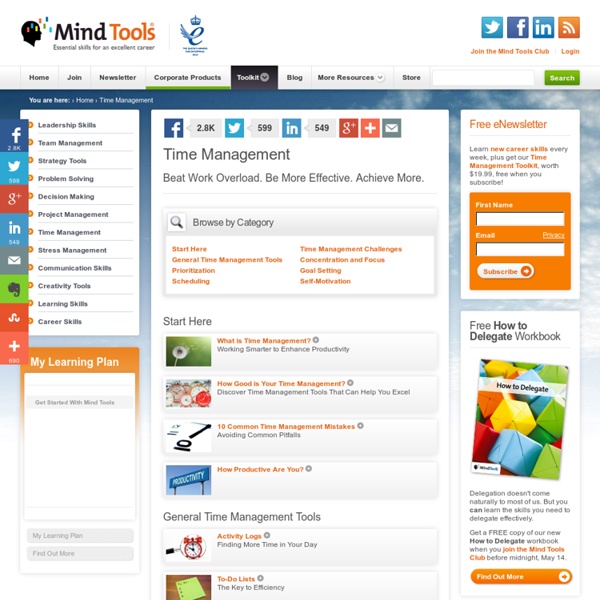



http://www.mindtools.com/pages/main/newMN_HTE.htm
Consumer Warnings Report We are not affiliated in any way with any news organization. This is an advertisement for Internet Profit Packet. It is important to note that this site and the stories and even images (including check) depicted above is to be used as an illustrative example of what some individuals have achieved with this/these products. This website, and any page on the website, is based loosely off a true story, but has been modified in multiple ways including, but not limited to: the story, the photos, and the comments.
10 Common Time Management Mistakes - from Mind Tools.com Avoiding Common Pitfalls Learn how to overcome several common time management mistakes. How well do you manage your time? If you're like many people, your answer may not be completely positive! Perhaps you feel overloaded, and you often have to work late to hit your deadlines.
Locke's Goal Setting Theory - Understanding SMART - Goal Setting Tools from MindTools Setting Meaningful, Challenging Goals Learn how to set effective goals, in this short video. What you get by achieving your goals is not as important as what you become by achieving your goals.Henry David Thoreau, American author and philosopher. Many of us have learned – from bosses, seminars and business articles – the importance of setting ourselves SMART objectives. Model Thinking This course will consist of twenty sections. As the course proceeds, I will fill in the descriptions of the topics and put in readings. Section 1: Introduction: Why Model?
The 48 Laws of Power Background[edit] Greene initially formulated some of the ideas in The 48 Laws of Power while working as a writer in Hollywood and concluding that today's power elite shared similar traits with powerful figures throughout history.[5] In 1995, Greene worked as a writer at Fabrica, an art and media school, and met a book packager named Joost Elffers.[4][8] Greene pitched a book about power to Elffers and six months later, Elffers requested that Greene write a treatment.[4] Although Greene was unhappy in his current job, he was comfortable and saw the time needed to write a proper book proposal as too risky.[10] However, at the time Greene was rereading his favorite biography about Julius Caesar and took inspiration from Caesar's decision to cross the Rubicon River and fight Pompey, thus inciting the Great Roman Civil War.[10] Greene would follow Caesar's example and write the treatment, which later became The 48 Laws of Power.[10] He would note this as the turning point of his life.[10]
How to Make Good Decisions ... Faster Take a look at this paragraph: Cna yuo raed tihs? I cdn'uolt blveiee taht I cluod aulaclty uesdnatnrd waht I was rdanieg. Pomodoro Technique Time management method A Pomodoro kitchen timer, after which the method is named. The Pomodoro Technique is a time management method developed by Francesco Cirillo in the late 1980s.[1] The technique uses a timer to break down work into intervals, traditionally 25 minutes in length, separated by short breaks. Each interval is known as a pomodoro, from the Italian word for 'tomato', after the tomato-shaped kitchen timer that Cirillo used as a university student.[2][3] The technique has been widely popularized by dozens of apps and websites providing timers and instructions. Closely related to concepts such as timeboxing and iterative and incremental development used in software design, the method has been adopted in pair programming contexts.[4]
9 Daily Habits That Will Make You Happier Happiness is the only true measure of personal success. Making other people happy is the highest expression of success, but it's almost impossible to make others happy if you're not happy yourself. With that in mind, here are nine small changes that you can make to your daily routine that, if you're like most people, will immediately increase the amount of happiness in your life: 1. Start each day with expectation. If there's any big truth about life, it's that it usually lives up to (or down to) your expectations.
OccupyWriters.com Thirteen Observations made by Lemony Snicket while watching Occupy Wall Street from a Discreet Distance 1. If you work hard, and become successful, it does not necessarily mean you are successful because you worked hard, just as if you are tall with long hair it doesn’t mean you would be a midget if you were bald. 2. Tools for Decision Analysis Tools for Decision Analysis:Analysis of Risky Decisions Para mis visitantes del mundo de habla hispana, este sitio se encuentra disponible en español en: Sitio Espejo para América Latina Sitio en los E.E.U.U.Making decisions is certainly the most important task of a manager and it is often a very difficult one. This site offers a decision making procedure for solving complex problems step by step.It presents the decision-analysis process for both public and private decision-making, using different decision criteria, different types of information, and information of varying quality. It describes the elements in the analysis of decision alternatives and choices, as well as the goals and objectives that guide decision-making. The key issues related to a decision-maker's preferences regarding alternatives, criteria for choice, and choice modes, together with the risk assessment tools are also presented.To search the site, try Edit | Find in page [Ctrl + f].
What are the ten rules you need to know to communicate effectively? Frank Luntz has “engineered some of the most potent political and corporate campaigns of the last decade.” His wordsmithing helped Republican Rudy Giuliani get elected twice in New York — a city where Democrats outnumber Republicans 5-to-1. Luntz and his polling firm have learned a great deal about language by conducting nearly 1500 surveys and focus groups for a wide range of products and politicians.